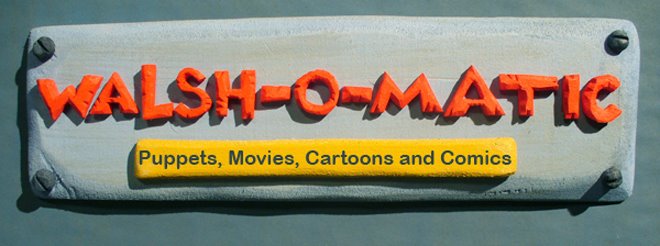
Months ago, I wrote about a production that came to Toronto, Famous Puppet Death Scenes. It's a wonderful and inventive show, overall.
Some of the most powerful moments in that show come in the conclusion, as the Narrator puppet is "laid to rest". The emotional connection between the audience and the puppet was remarkable, possibly the strongest I've ever witnessed.
That's part of the magic of theatre, of course- the amount of suspension of disbelief required in a live setting (to believe a puppet is living and breathing) can result in a huge emotional connection with that puppet, on the part of the audience. The audience so clearly KNOWS the puppet is just string and wood and wire, but that same audiences WANTS that puppet to be alive. So much has to be invested emotionally by the audience, and that investment pays off in a massive emotional connection with the character. And if something tragic or dramatically tense should involve that character with whom the audience has had to will into life (and of course something dramatic always does befall a character, if its good theatre), the toll it can take on an audience can be devastating.
In a good way, typically.
At a climactic moment in excellent puppet theatre, the engaged audience says to itself, "I knew from the start you weren't real, but I fell for you, I believed in you. And then I forgot you weren't real, and just loved you as a living character. So please don't leave me now. I've invested so much in you. I've fallen so deeply for you."
Of course without excellent puppetry skills none of this happens, but I don't think any puppeteers reading this will be upset if I gloss over their role (at least in this particular posting). After all, if he or she is doing a wonderful job, it's simply the character that is alive on stage. The puppeteer dissolves away...
Case in point: the New London Theatre's production of War Horse. Here's an article on the show. The article also has a link to a Youtube trailer that features the puppets in action.
I haven't had the pleasure, but what impresses me about the production (as its depicted in the article) is the emotional reaction audiences are having to the horse puppets. It sounds like some incredibly powerful connections are being created, with audiences in tears, stirred so deeply by it all.
I love puppet theatre, because its immediate and live nature can grab an audience's emotions in such a raw, magical way. But it also scares the pants off me, when I think of trying to create it- so much can go wrong when you're live!
Stop motion allows for a lot of control, and "reshoots" if things aren't right. It's safe to make, and of course, can then be shown the world over via broadcast or screenings. Theatre simply doesn't travel like motion picture!
But I also think stop motion (through its non-live, careful production method) simply cannot grab the audience in such a primal fashion as a live production like War Horse can. Stop motion certainly can create an emotional response from an audience, but it's just not going to be as magical and remarkable as something live.
Live puppet theatre is very risky, but the potential pay-off is huge.
Thanks to Mark Mayerson for the tip-off on this show.

No comments:
Post a Comment